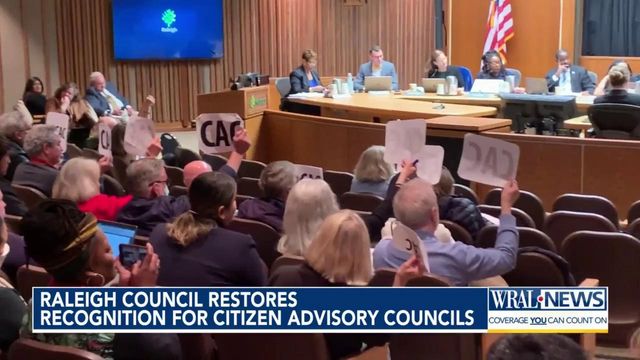Raleigh's reinstatement of Citizen Advisory Councils empowers grassroots groups
Raleigh neighborhoods will once again have a say in city council decisions.
On Tuesday, the Raleigh City Council voted unanimously to reinstate Citizen Advisory Councils or CACs.
Tuesday’s decision reverses a previous council’s to disband the grassroots groups that helped decide the fate of development for nearly 50 years.
Before the city eliminated the program, there were 18 CACs; half continued to meet even without official recognition from the city. Each CAC represents a different parts of Raleigh.
Leaders of the groups came before the city council on Tuesday holding up CAC signs to push for a vote.
District E City Council Member Christina Jones led Tuesday’s vote to reinstate CACs.
Jones was chair of all the CACs in February 2020 when the city council voted to get rid of them without notice.
“When the community spends years advocating to be brought back in the fold, we have an obligation to respond clearly and definitely,” Jones said. “I hope this motion will close a painful chapter in our history, and open the door to building something that’s going to outlive us all.”
The Raleigh City Council created the RCAC 50 years ago in 1974 with the help of Raleigh’s first African-American mayor, Clarence Lightner. The RCAC said its purpose is to give a voice to all Raleigh residents. Also, the CACs gave people a voice when developers wanted to rezone land within their neighborhoods. CAC members would vote to recommend or reject projects.
“We're very concerned about the time that we lost,” said Southeast Raleigh CAC Chair Ulysses Lane. “We want to bring back some positive relationships, and we want to kind of address those issues that have been kind of left off the table.”
The city changed its rezoning process since then, so it’s unclear what authority the CACs will have moving forward.
“There’s been a void for a long time, especially in underrepresented areas,” Lane said.
Mayor Mary-Ann Baldwin and Mayor Pro Tem Jonathan Melton voted with the council to reinstate the CACs; both were part of the city council that dismantled the CACs in 2020.
The CAC groups will get free access to meet in city facilities and be able to use city-owned technology for their meetings.
Current CAC chair Robert Rice said they’re working to bring back the CAC groups that stopped meeting.
“Lacking that relationship with city council really undercut the community, and a lot of people felt very disillusioned,” Rice said.











